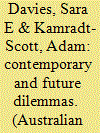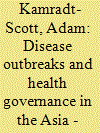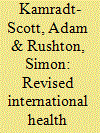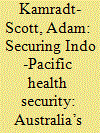| Srl | Item |
| 1 |
ID:
163169


|
|
|
| 2 |
ID:
095036


|
|
|
| 3 |
ID:
143284


|
|
|
|
|
| Summary/Abstract |
The growing trend toward the securitization of infectious disease has legitimated a role for national militaries in responding to public health crises. This apparent “militarization” of health has met with resistance from the health and security sectors alike, who argue that it risks politicizing health outcomes while also draining limited military resources. This article attempts to place such concerns within the broader historical context of military involvement in public health. With specific reference to pandemic influenza—a disease of great historical import and a current policy priority in the context of securitized global public health—this article details the pedigree of military involvement in fighting the disease and draws on the established record to demonstrate the role that militaries can play in improving public health outcomes. The article argues for an ongoing military role in the global fight against pandemic influenza, both in augmenting civil influenza programs and in improving their own preparation and response mechanisms for future pandemics.
|
|
|
|
|
|
|
|
|
|
|
|
|
|
|
|
| 4 |
ID:
109870


|
|
|
|
|
| Publication |
2012.
|
| Summary/Abstract |
This paper takes a constructivist approach to examining one of the new norms embodied in the recently revised International Health Regulations (IHR). The paper focuses on the provisions that seek to restrain states from applying disproportionate international travel and trade restrictions in response to a disease outbreak occurring in another country. This new norm, which aims to limit unjustified 'additional health measures', has significant implications for state sovereignty. Using the example of the 2009 H1N1 'swine flu' pandemic, the paper examines whether state behaviour and the discourse surrounding that outbreak supports a constructivist contention that a new norm has been created and that most states can be expected to comply with that norm most of the time. We conclude by discussing what the discourse over H1N1 suggests about the extent to which the new norm concerning additional health measures has been internalized by states.
|
|
|
|
|
|
|
|
|
|
|
|
|
|
|
|
| 5 |
ID:
163171


|
|
|
|
|
| Summary/Abstract |
In the wake of several prominent disease outbreaks like Ebola and Zika, global health security is once again high on the international agenda. For its part, the Australian government has committed itself to strengthening regional health security. This policy direction – focusing on the Indo-Pacific region – is both consistent with Australia’s traditional foreign policy approach of concentric circles informing strategic priorities, and is therefore understandable, even predictable. But given that local disease outbreaks in remote locations around the world now have the opportunity to travel rapidly internationally, is the adoption of an exclusively regional focus the most sensible one? This article considers the implications of Australia’s new regional health security initiative, its focus and direction. The paper weighs the benefits and drawbacks of Australia’s new programme and considers whether a wider focus is more appropriate for responding to the health threats of the twenty-first century.
|
|
|
|
|
|
|
|
|
|
|
|
|
|
|
|
| 6 |
ID:
144242


|
|
|
|
|
| Summary/Abstract |
Since 2001 the World Health Organization (WHO) has been actively promoting its credentials for managing ‘global health security’. However, the organisation’s initial response to the 2014 Ebola outbreak in West Africa has attracted significant criticism, even prompting calls for its dissolution and the creation of a new global health agency. Drawing on principal–agent theory and insights from previous disease outbreaks, this article examines what went wrong, the extent to which the organisation can be held to account, and what this means for the WHO’s global health security mandate.
|
|
|
|
|
|
|
|
|
|
|
|
|
|
|
|